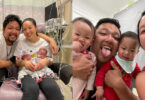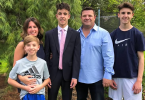We are so lucky to have Amy Keir working with us in our NICU as a Neonatal Fellow. She recently published an amazing article called “Please call my baby by her name” in the Acta Paediatrica, which makes it clear why we love her so much, and is also an interesting and vital exploration of the importance of communication between physicians and families.
Australian Amy being a good Canadian!
We were so impressed by this piece that we wanted to ask Amy a few questions about herself and about her ideas regarding communication; here are her answers.
1. Who are you?
I moved to Toronto from Australia last year to take up as position as a Clinical Fellow in the University of Toronto’s Neonatal-Perinatal Medicine fellowship training program. Whilst I already have my specialist qualification as a Neonatologist in Australia, I wanted to gain further clinical and research experience, as well as have the experience of living overseas. My partner, Jeff, came along with me to Canada and he has been a fantastic support, especially when the homesickness hits or when I need to be told to go to bed after a 24 hour in-house call shift!
2. Why did you feel compelled to write your article?
It really was listening to two former NICU parents that inspired me to write. What they said stayed with me and formed the basis of the article.
Communication is an area I feel passionate about and I believe all health care professionals can, and should, continue to develop and improve their communication skills throughout their careers. What we say or don’t say to families can have a huge and lasting impact. Writing the article gave me an outlet to express my thoughts about what I feel is such an important, and sometimes, neglected area.
3. What kind of response have you had to your article?
I have been excited by the response I have had to my article. The positive feedback and emails I have received from colleagues has been fantastic – the themes the article touched on seems to have resonated with many of my colleagues who work in the NICU. The article was also featured as a leading article on 99nicu.org, an internet forum for people working in Neonatology, which was pretty exciting. Being asked to answer these questions for the Sunnybrook NICU blog has also been a highlight – it means a lot to have had the article so well received!
4. Where do you think you learned the most about communication? In your piece you mentioned communication skills training courses; does any particular training stand out to you as most effective?
I have learned communication skills from watching other people communicate well, which is probably what most people do with varying results! The best training though was a fantastic communication skills workshop back in Australia.
The most useful way to learn I have found is by role-playing, after having learned about various communication techniques – by trying out new skills in a simulated environment. I am still learning though and make mistakes – having the self-awareness that you still can and should be learning about effective communication is vital.
5. Why do you think there’s a disconnect between what medical professionals say and parents hear?
I think, as medical professionals, we sometimes forget the complete and utter shock the NICU experience can be. No one plans for their child to need intensive care and I continue to be amazed at how well our families do cope and how strong they are. Some of the things we have to talk to parents about are extraordinarily difficult and I think at times are almost too hard to hear. I have had families say to me that they have heard what we have said but that it was just too soon and too hard to hear at that time. Being accessible and present for all the families that you care for is one way to ensure that the lines of communication remain open. At other times though, it is because the communication from the medical professional is not clear and this is where I truly believe communication skill training can be extraordinarily useful.
6. Why did you choose neonatology?
Neonatology is such a fantastic specialty and I knew that after working as resident in my Neonatal Unit back home for the first time back in 2008, it was what I had been looking for – it was what I was ‘meant to do’. I am extremely fortunate to be able to work in a field that I love, to care for families and know that I will continue to learn throughout my career.
7. What kinds of communication errors do you hear regularly?
Calling infants a boy when they are a girl and vice-versa is a pretty common mistake. Some people probably don’t think it is a big deal but I think to many families it is.
False reassurance is another communication error I hear from time to time. We all want to reassure families that “everything will be alright” but for some situations in the NICU we simply do not know. I truly believe there is a way to communicate to families that you do care and are also hoping for the very best outcome but sometimes we do not know what the future will hold. Telling a family “everything will be ok” when it may not be does not help to establish trust.
8. Do you have any communication tips for NICU parents?
Always ask questions! Write them down and some parents also find writing down the answers to their questions can also help. The NICU is full of people to ask questions of – never be shy to ask questions. If you find a particularly great person to ask questions of – ask to speak to them again. Always know that you can ask to speak to your baby’s doctor or nurse practitioner if you haven’t managed to catch up with them that day.
9. What is the most important thing you have learned from NICU parents?
The strength of spirit NICU parents have continues to amaze me. Over the years, I continue to learn more and more about what a great job this is – by far my best experiences in Neonatology have been because of the families I have gotten to know and care for.
10. If there was one thing you could tell a new NICU family, what would it be?
You are the best advocates for your child. Ask questions of all members of the team and draw support from the team – we are there to help and guide you through this journey. Never be afraid to question someone or something. Get involved with as many aspects of care of your baby (or babies) as you can.
——-
Thank you Amy for taking the time to respond to our questions, and for the tremendous work you do with NICU families!








